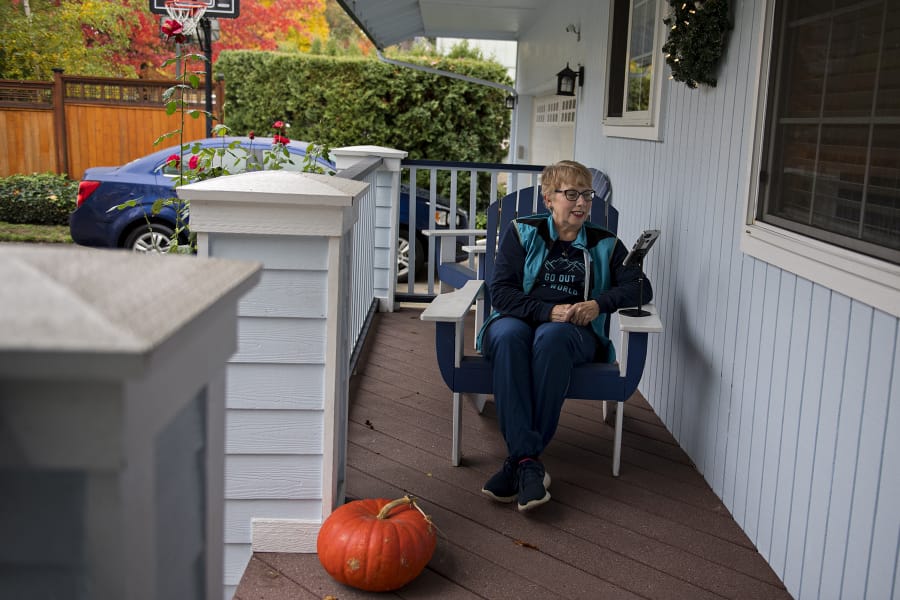Today, Dawn Iveane-Curell — along with some 500 other volunteers — will dial up local seniors to wish them a happy Thanksgiving.
“The thought of anyone being isolated in the pandemic was really unsettling to me,” Iveane-Curell said. The Vancouver resident has been volunteering since August for the pandemic-era Friendly Chat program offered by Meals on Wheels People.
The nonprofit organization delivered Thanksgiving meals earlier this week, and today, every senior who signed up for a Thanksgiving dinner will also receive a friendly phone call.
The calls aren’t just a holiday treat. They’re part of Meals on Wheels’ ongoing response to COVID-19. Under normal circumstances, Meals on Wheels volunteers deliver hot meals to seniors’ doorsteps four days a week, often staying for a brief chat. The nonprofit has delivered meals to 2,234 older adults in Clark County so far this year, but given the risk that the novel coronavirus poses to seniors, meals since the spring have arrived just once a week without those important face-to-face conversations. Instead, seniors receive old-fashioned phone calls.
“Our vision is that no senior will go hungry or experience social isolation,” said Julie Piper-Finely, executive director of Meals on Wheels People. “While phone calls are not the ideal solution, it keeps our seniors in touch with volunteers and they are not completely isolated between delivery days.”
Every call is different depending on the senior’s needs, volunteer Iveane-Curell said. She makes sure they’re getting their meal deliveries, that they’re warm enough, and that they’re staying in touch with loved ones. After that, conversations can be wide-ranging.
“That’s the whole goal, that they talk about anything and everything so they don’t feel isolated,” said Iveane-Curell, a certified life coach who appreciates the chance to put her training to good use. “A lot of it is just getting through this crisis and the stress of it and reassuring them that they’re not alone and that we’re all doing this together.”
Those aren’t just words for Iveane-Curell, who is profoundly touched and uplifted by her Friendly Chat conversations. Whether seniors are sharing personal histories or recipes, said Iveane-Curell, they’re deeply appreciative of the person-to-person connection — and so is she.
“Truthfully, I get as much out of volunteering as they do. I use it as my connection time while I’m walking,” said Iveane-Curell. “They’re my walking buddies.”
Judy Ellis likes volunteering for the Friendly Chat program because it’s a safe way to help others, and the people she meets are so fascinating and so open to lively conversation, she said.
“It makes a difference to me because I’m making someone else feel good,” said Judy Ellis, who’s been a Friendly Chatter since April. “Some of the stories they tell me are quite interesting — their background, being raised on farms in the early 1900s. … Everybody has a story. I feel like I can be a vehicle for them to tell someone their story.”
One of Ellis’ favorite calls was to a woman in her late 90s.
“She was so lively and such a charming person and so optimistic about life, and that just hit home,” Ellis said. “I said, ‘Well, do you have any piece of advice, since you’ve lived such a long life?’ And she said, ‘Oh, no. I just try to remain optimistic about everything and everything works out.’ I thought, ‘What a great view on life in general.’ She just sounded so upbeat.”
Battle Ground resident Doug Jones, 81, has been living on his own since his wife passed away two years ago. His dog was good company but recently went to “doggie heaven,” Jones said. He has family in Yacolt and his neighbors are kind, he said, but the extra time alone is tough for someone as outgoing and cheerful as he is.
“You can only look at four walls for so long,” said Jones, who relishes the regular phone calls from Meals on Wheels volunteers.
“It’s good to just have the interplay of conversation,” said Jones. “Even though you’re not looking at someone, you’re at least talking with them.”
Patricia Edwards, 76, has been receiving Friendly Chat calls since the spring.
“They’re all very friendly and very nice and very positive,” Edwards said. “That’s the part I like. In this coronavirus situation, talking to a positive person is very helpful.”
Friendly Chats gives Edwards a chance to have “a real conversation,” she said — something more meaningful than exchanging a few brief words with her neighbors or her doctors.
“They call me quite frequently, especially since the pandemic, just to do a ‘well check.’ That is very comforting,” Edwards said. “They’re very polite. They ask if I need anything or if I’m OK, and then I get started talking.”
Friendly Chat volunteer Ellis thinks this conversational connection is more than a mood-booster; it’s fundamental for well-being, especially during the pandemic. Maybe COVID-19 makes in-person volunteering difficult, but people can still make a big difference by offering their ears and hearts.
“It’s a chance for them to come out of their shells, come out of their isolation and talk to someone who will listen to them,” said Ellis. “Bottom line, isn’t that what everyone wants? For someone to listen to them, to offer encouragement and be heard?”





